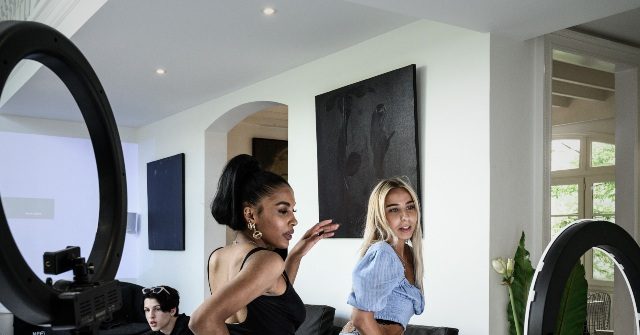China's TikTok Helps Teens Go Viral with Racy Videos, Harming Mental Health
The algorithm for the Chinese-owned TikTok app makes it easier for teens to go viral and gain internet fame, especially with sexualized videos.

But the downside of posting racy videos to social media is the toll taken on teens’ mental health, according to mental health professionals. To the dismay of many, the Chinese-owned social media app TikTok has become the preferred platform amongst teens today. Three girls watching TikTok videos (Luiza Nalimova/Getty) ByteDance CEO Zhang Yiming, TikTok’s owner. (STR/Getty) But unlike other social media platforms — such as Facebook, Instagram, YouTube, and Twitter — going viral on TikTok and becoming “TikTok famous” is much easier and quicker, according to a report by the Wall Street Journal. TikTok weighs whether viewers show strong interest in a particular type of content — measured by whether they finish watching videos — the company says.
The app’s recommendation engine then chooses videos to send to viewers, regardless of the creator’s follower count or past video virality. Given that TikTok users appear to take more of an interest in sexual or risqué content, teens have realized that the more sexual their videos are, the more likely they are to get likes or go viral, mental health professionals say. “Many of them have figured out that the formula for that is producing more sexual content,” said Carter Barnhart, co-founder of Charlie Health, a virtual mental health care provider. Barnhart added that a growing number of teens she treats report their self-esteem is dependent on how many likes they get on TikTok. Jula Anderson, for example, joined TikTok when she was 16. Her first video featuring her family’s home renovations only got five likes. But when she saw that other users were posting more suggestive content, she tried it, too. “I wanted to get famous on TikTok, and I learned that if you post stuff showing your body, people will start liking it,” Anderson, now an 18-year-old high school student, told the Wall Street Journal. A few months later, the teen’s wish came true, as a video of her wearing a tight-fitting tank top while lip-syncing to “Sunday Best” by Surfaces went viral, the newspaper reports. TikTok’s algorithm had pushed the video to viewers’ “For You” pages, which resulted in more than one million people viewing the content, and nearly 500,000 people liking it. Anderson’s TikTok following then went from a few hundred users to more than 200,000.
The comment section of the teen’s video was then inundated with boys and men saying how hot she looked. Inspired by the success, Anderson made her videos more risqué. “I’d wear clothes that I wouldn’t wear to school but that I felt good in,” she said. “I didn’t view them as that sexual, but other people did.” The teen then found herself constantly checking her TikTok likes, saying, “It was my whole world.” When Anderson’s parents later discovered their teenage daughter’s suggestive video content on TikTok, they confronted her about it, to which Anderson said, “Mom, that’s what everyone is doing,” according to the teen’s mother, Shauna.
The teen’s mother, in part, blamed the isolation stemming from the Chinese coronavirus, which she says intensified her daughter’s need to find connection with others. “She thought this was a way to be liked and have friends,” Shauna said. Mental health professionals say they are concerned about how teen girls will be affected by posting sexualized content on TikTok, and that young girls are oftentimes anxious and overwhelmed by the attention they get after posting suggestive videos. “For a young girl who’s developing her identity, to be swept up into a sexual world like that is hugely destructive,” said Paul Sunseri, a psychologist and director of the New Horizons Child and Family Institute in California. Last year, Anderson began receiving treatment at the New Horizons Child and Family Institute for anxiety and depression. “When teen girls are rewarded for their sexuality, they come to believe that their value is in how they look,” Sunseri said. Sunseri added that roughly a quarter of the female patients at his clinic have produced sexualized content on TikTok. You can follow Alana Mastrangelo on Facebook and Twitter at @ARmastrangelo, and on Instagram.
Read the full article at the original website
References:
